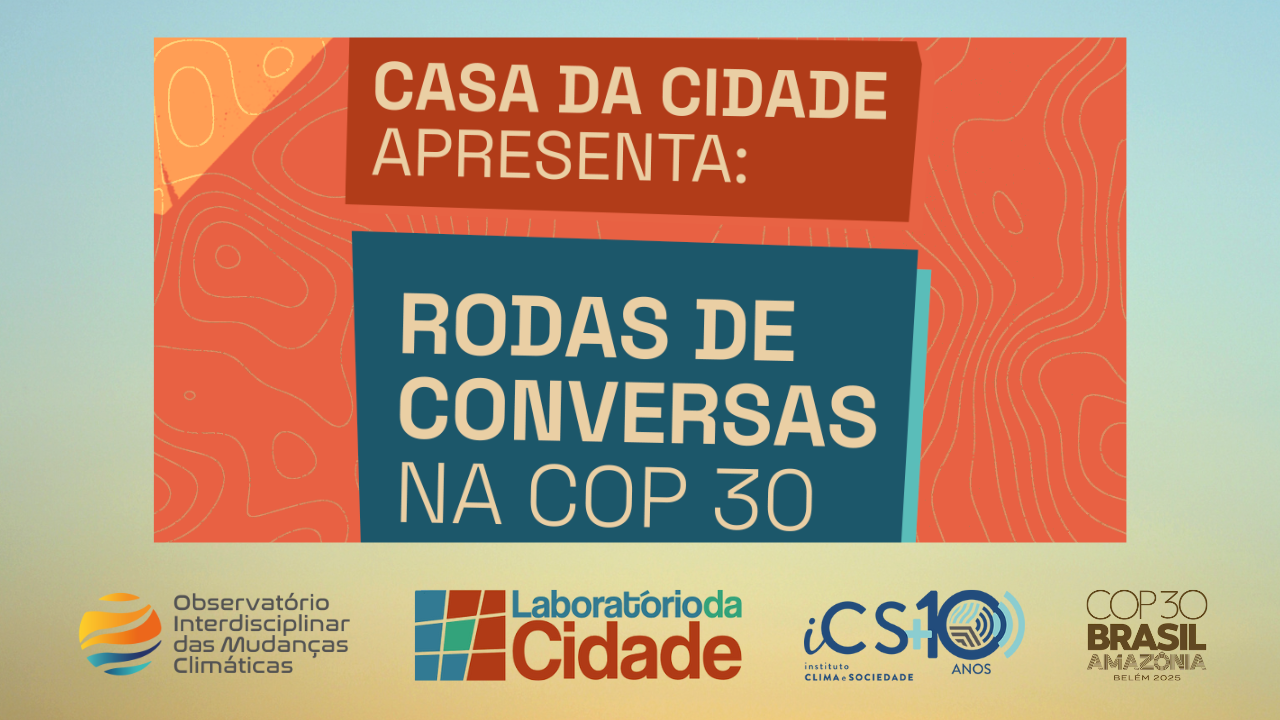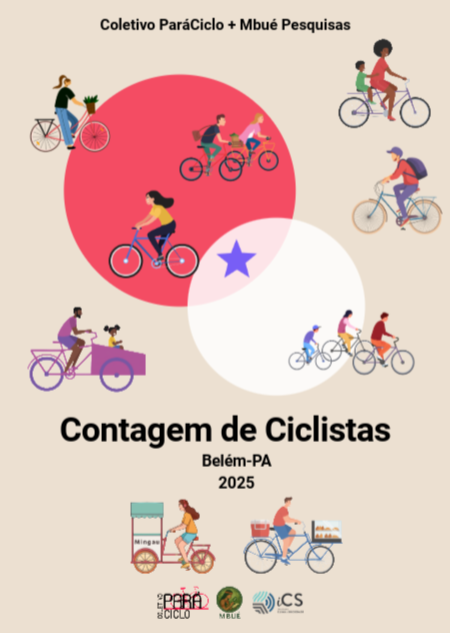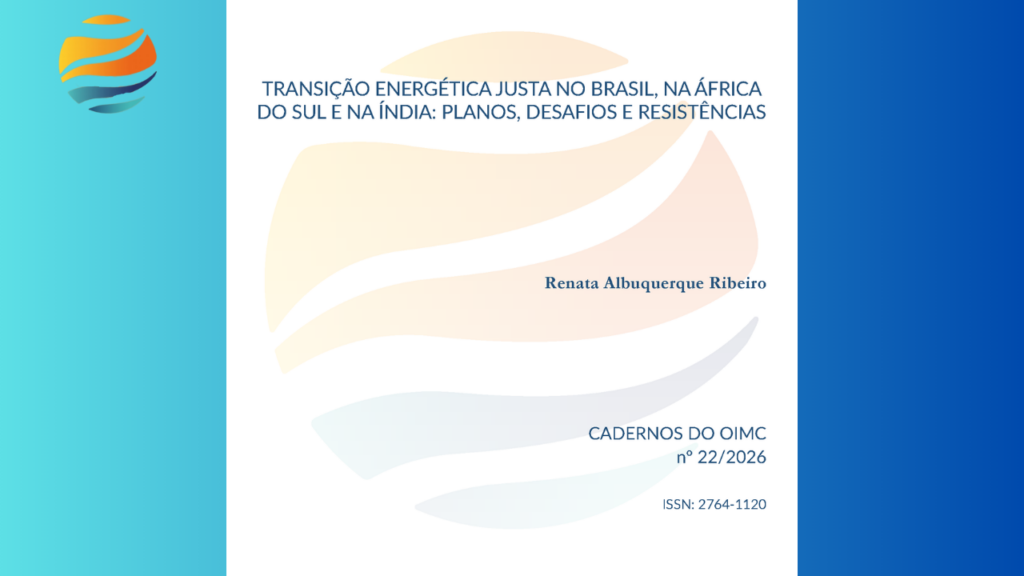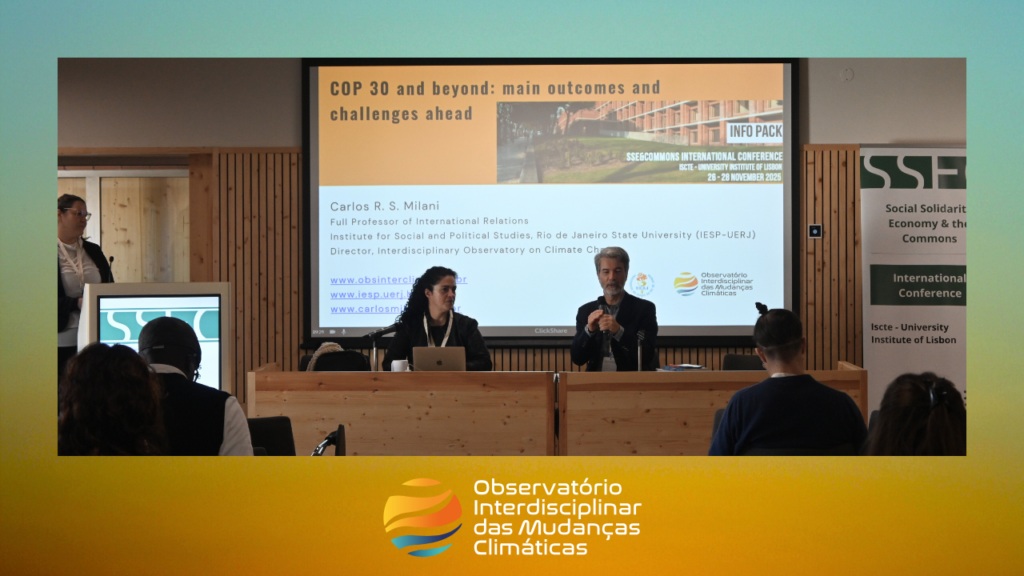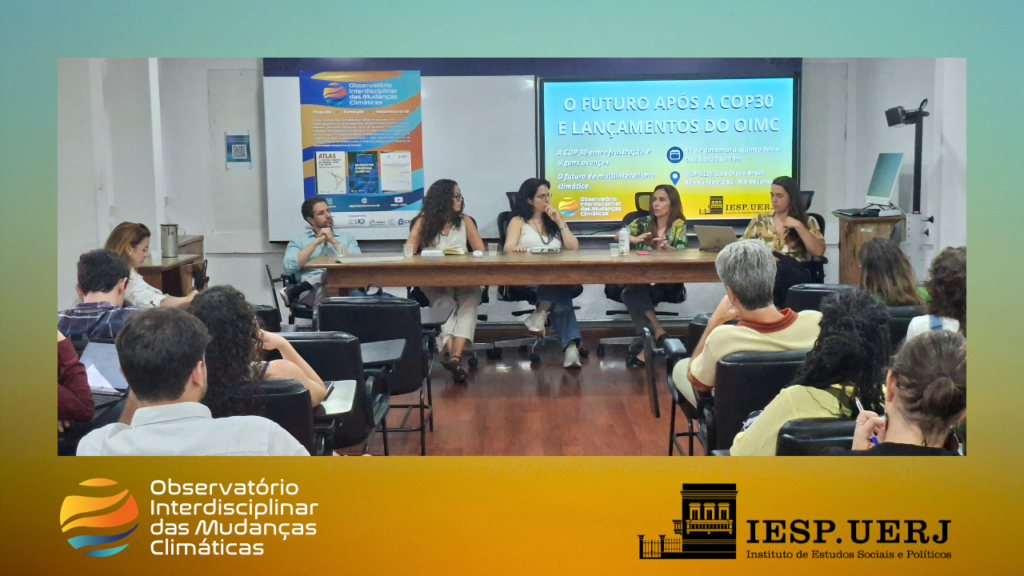During the second week of the 30th United Nations Climate Change Conference (COP30), the Interdisciplinary Observatory on Climate Change, the City Laboratory, and the Institute for Climate and Society (iCS) continue with the programme of the Roundtable Discussions at Casa da Cidade, in Belém do Pará. The eight meetings that complete the cycle are offered in person at Casa da Cidade twice a day, always at 4 p.m. and 6 p.m., followed by events marking the release of publications on topics relevant to the climate agenda at 7:30 p.m.
The activities that run alongside the Conference of the Parties aim to create a space for plural, horizontal and diverse dialogues on key issues on the climate agenda in general – and on conference negotiations in particular – between representatives of social movements, indigenous and quilombola communities, research centres, climate scientists, journalists, communicators, youth collectives and community leaders.
See below for the schedule for the second week:
- 17 November, Monday:
4pm-5.30pm – Archaeology of Knowledge, Strategies in the Present: territories and communities facing the climate emergency
| With: Bianca Barbosa (Marajó Observatory), Ana Rosa Calado (Engajamundo) and Eduardo Góes Neves (CESTA-USP). Moderation: Hannah Balieiro (iCS). This meeting aims to reflect on the knowledge that endures, the strategies that emerge, and the possible futures built from local experiences. The actions of territories and communities, their populations – indigenous peoples, traditional communities, peripheral populations of large cities – in the context of the climate crisis. What are the challenges, obstacles and strategic possibilities in response to the climate agenda? How can ways of life and livelihoods, in examples and evidence of ancestral and technological practices, become paths to respond to this emergency? |
6pm-7.30pm – Development: is it possible to reconcile it with climate action?
| With: Philip Yang (COP 30 Special Envoy – Cities), Patricia Pinho (IPAM Amazon) and Maria Netto (iCS). Moderation: Carlos R. S. Milani (OIMC-UERJ). This roundtable seeks to reflect on how the relationship between development and climate change is currently viewed. What is development? Is it possible for both poles to coexist harmoniously under the formula of ‘sustainable development’? How can we deal with the urgency of the climate issue and the imperatives of ensuring better material living conditions for populations? |
7.30pm – Release: Results Notebook Climate Adaptation in Urban Amazonia – Exploring Evidence for Fairer and More Adapted Cities
| Publication of the Lab.Pesquisa project, promoted by Laboratório da Cidade. More about the project |
- 18 November, Tuesday:
4pm-5.30pm – Mangroves, carbon and climate justice: necessary adaptations
| With: Carlos Alberto Pinto dos Santos (CONFREM), Louiziane Gabrielle Souza Soeiro (CNPT/ICM-Bio), Johny Fernandes Giffoni (DPE-PA) and Erica Jimenez (Rare). Moderation: Viviane Fernandez (OIMC). The proposed activity will discuss different aspects related to the conservation of mangroves and the traditional peoples and communities associated with them, in two rounds of conversation. The debates will focus on various issues directly or indirectly associated with climate change, such as the challenges for adaptation and reduction of the vulnerability of mangroves in the face of predicted changes, the role of mangroves in tackling climate change, the advance of the oil industry on the Brazilian equatorial coast, the carbon market and conservation units as a strategy for tackling climate change. It is hoped that this will provide different perspectives on the issue of climate change and Brazilian mangroves and contribute to the presentation of proposals for action, based on the National Programme for the Conservation and Sustainable Use of Mangroves in Brazil – ProManguezal. |
6pm-7.30pm – Oil, Climate, Mangroves and Tidal Communities: What is at Stake?
| With: Sandra Regina Pereira Gonçalves (CONFREM), Juliano Bueno de Araujo (Instituto Arayara), Luene Karipuna (APOIANP) and Yuri Silva (Instituto Mapinguari). Moderation: Mário Soares (OIMC e NEMA). The proposed activity will discuss different aspects related to the conservation of mangroves and the traditional peoples and communities associated with them, in two rounds of conversation. The debates will focus on various issues directly or indirectly associated with climate change, such as the challenges for adaptation and reduction of the vulnerability of mangroves in the face of predicted changes, the role of mangroves in tackling climate change, the advance of the oil industry on the Brazilian equatorial coast, the carbon market and conservation units as a strategy for tackling climate change. It is hoped that this will provide different perspectives on the issue of climate change and Brazilian mangroves and contribute to the presentation of proposals for action, based on the National Programme for the Conservation and Sustainable Use of Mangroves in Brazil – ProManguezal. |
7.30pm – Release: Guide of best practices in urban environmental management in the Legal Amazon
| Publication produced by the DUSA Coalition in partnership with the Brazilian Ministry of the Environment and Climate Change. More about the project |
- 19 November, Wednesday:
4pm-5.30pm – Science, politics and climate: complex interrelationships, possible actions
| With: Thelma Krug (COP30 Scientific Committee), Natália D’Alessandro (MCTI) Ana Claudia Cardoso (FAU-UFPA) and Beatriz Luraschi (International Climate Politics Hub). Moderation: Lucas Nassar (City Laboratory). The discussion will focus on why, despite the detailed scientific knowledge we currently have about the causes of climate change and ways to tackle it, there is still a huge gap between knowledge and action. This roundtable seeks to debate: What are the biggest challenges for science today? How should politics respond, in a changing world, to science’s agency on the climate agenda? What strategies can help transform climate science into action? |
6pm-7.30pm – Agri-food systems of the future
| With: Ricardo Abramovay (USP), Marco Antonio Teixeira (Lateinamerika Institut/FU-Berlin), Anália Barreto (Instituto Mapinguari) e Francine Xavier (Comida do Amanhã). Moderation: Kamyla Borges (iCS). How can the integration of forests, agriculture and livestock farming advance current production models towards a more sustainable system? What are the impacts on the quality of food produced and on nutritional justice? |
7.30pm – Release: 2025 Cyclist Count and ‘2025 Origin-Destination Survey’
| Project fron Paraciclo Colective. More information |
- 20 November, Thursday:
4pm-5.30pm – Education for the Climate Crisis
| With: Samilly Valadares (Perpetuar), Maria Malcher (CEDENPA), and Bruna Bataglia (OIMC). Moderation: Elza Neffa (OIMC and PPGMA/UERJ) Education and teaching as a tool and power in the face of the climate crisis. How can we renew teaching and learning methods to address the complexities of the climate crisis? |
6pm-7.30pm – If this street were ours
| With: Lucas Machado (LabClima), Karoline Vale (LabClima), Beatriz Pimentel (LabClima) and Nícolas Quintero (LabClima). Presentation and discussion of the City Laboratory’s climate education project with young people from Pará. |
19h30 – Release: The Climate Emergency Knocks on the Door: How can we overcome fatalism and imagine sustainable futures?
| Second volume of the Climate Emergency Collection, organised by Bruna Bataglia and Carolina de F; Garrido More about the collection |
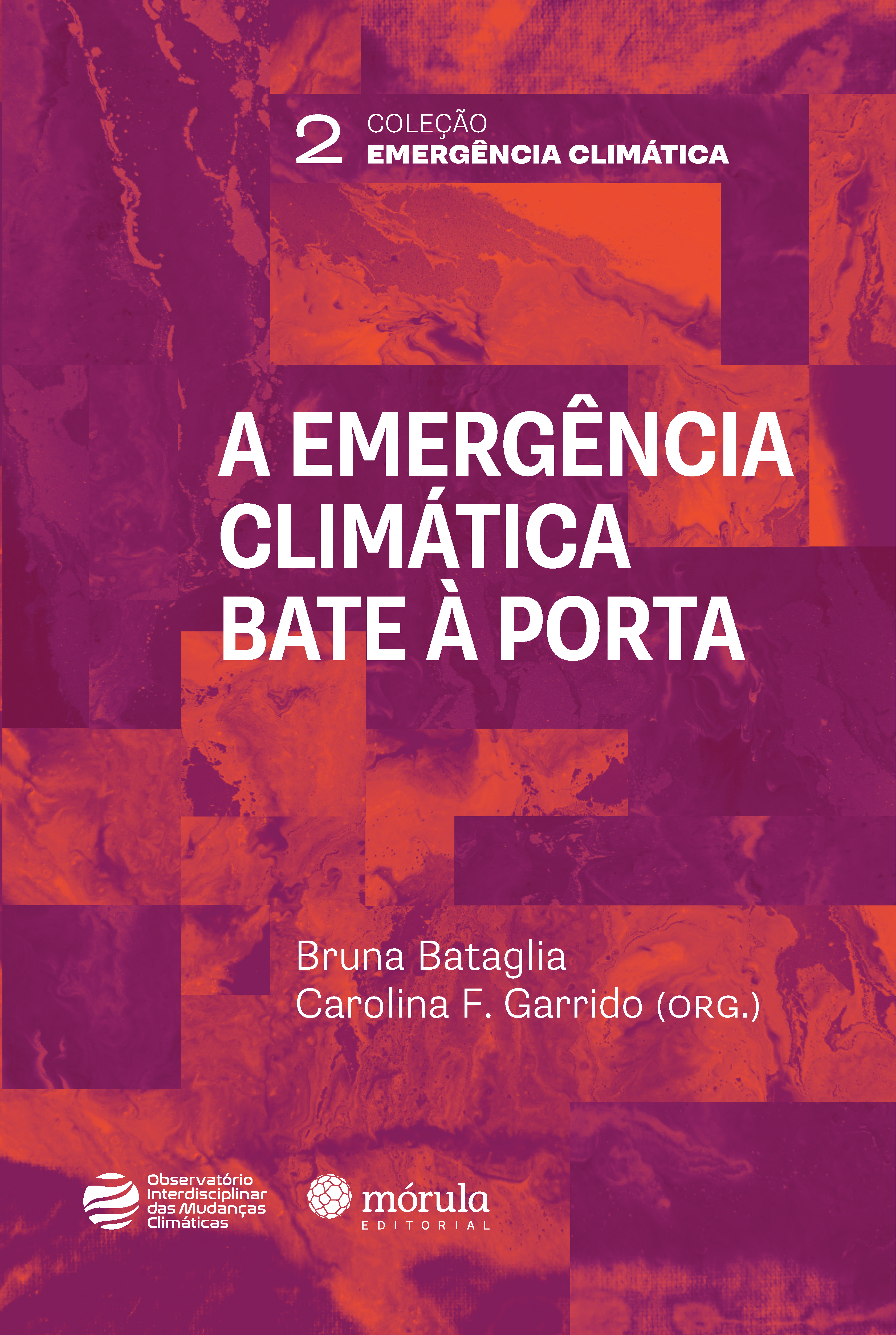
The entire programme for the Roundtable Discussions at Casa da Cidade is the result of curatorship and organisation by the City Laboratory, the Interdisciplinary Observatory on Climate Change and the Institute for Climate and Society. Participation in each event will be determined on the basis of arrival, with no prior registration required. Casa da Cidade is located at Travessa Rui Barbosa, 257 (Reduto) – Belém (PA).
